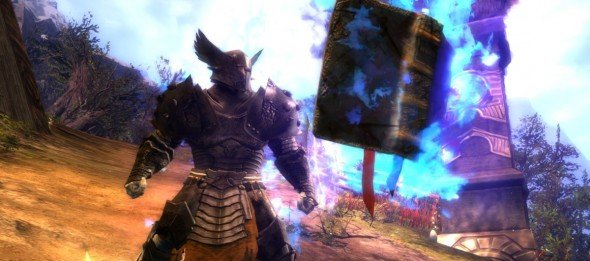Guild Wars 2 dungeons preview

Had we been higher level, we would have had a slightly easier time - but as players are levelled down to match the area they're in, this would have simply provided a boost to our versatility. The emphasis really is on player skill, and instead of frustration at our lack of preparation I felt the spike of energy that I get when a game is difficult and the responsibility is on me to improve myself. That's a personal impression, of course, but I suspect it'll be exactly what some players are looking for. “Some people will say 'this is just way too hard for me'”, Johanson says, “and we have 95% of the game available for them. What we're trying to do is create encounters in the sense that these are things where you can beat it, but when you lose you have a sense of 'I didn't play well enough to overcome this, I want to come back and play better.'”
By minimising the amount of min/maxing you need to do, ArenaNet are making a game where you can't fail a dungeon before you've even started. Johanson is candid about the fact that this is something Guild Wars 1 struggled with. “We would build a dungeon and what would end up happening - and part of this is a symptom of the way Guild Wars 1 worked - there was a certain build that people needed to beat that dungeon. That's a problem - there can't be any one way to do things or that's the only way people will do it.”
ArenaNet's rejection of the 'trinity' of healer, damage and tank classes is part of that effort to add more variety to group play. Every day, according to Johanson, Guild Wars 2's QA team takes on a dungeon with a different group composition. “We'll play them with five thieves, and we'll play them with five engineers, and then we'll play them with three thieves and two rangers. We bounce the group composition around constantly. What we found, over and over again, is that it's the skill of the players, and the professions make almost no difference. It's how good you are playing that profession.”
Puzzle dungeons, which also take place in the open world, task you with solving a series of riddles and environmental puzzles to progress. You might need to find the missing pieces of a statue or interpret clues to figure out how to disarm a trap. The one I was shown took place entirely underwater, and we had to release freezing bubbles of air from caskets and attack them to release a burst of ice in order to extinguish magical flames. Solving a series of these problems, we were promptly wiped out by the ultra-tough boss guarding the loot chest at the end. I'm honestly not sure how far we'd have gotten without the help of the designers who created the dungeon, but the purpose of the content is to provide the most dedicated players with a problem to solve. Riddle solutions will likely become well-known fairly quickly, but pulling them off while still doing everything else that a dungeon requires will require a lot of skill.
I was shown a comprehensive slice of Guild Wars 2's toughest content, and came away impressed. While puzzle and exploration dungeons were too hard for my party to deal with, I could see that they'll give talented players a chance to shine. As someone with a limited amount of patience for raiding, I'm excited to give Guild Wars 2's alternate take on endgame content another go. Fans of raiding will, I think, find it a tougher sell - but hopefully the personal rewards of mastering a class will compensate for the lack of purple drops. For better or worse, it's been too long since we've seen genuine innovation in MMO group play.
Keep up to date with the most important stories and the best deals, as picked by the PC Gamer team.
Joining in 2011, Chris made his start with PC Gamer turning beautiful trees into magazines, first as a writer and later as deputy editor. Once PCG's reluctant MMO champion , his discovery of Dota 2 in 2012 led him to much darker, stranger places. In 2015, Chris became the editor of PC Gamer Pro, overseeing our online coverage of competitive gaming and esports. He left in 2017, and can be now found making games and recording the Crate & Crowbar podcast.


